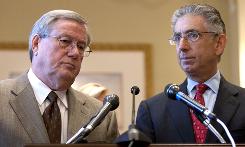|
|
|||||||||||||||||||
By Paul Wiseman, USA TODAY
WASHINGTON — The Democrat and the Republican leading an investigation into the causes of the financial crisis have vowed to set aside political differences and find answers for a furious and bewildered public.
"People's confusion about it, their anger about it, knows no partisan bounds," says Democrat Phil Angelides, the former California treasurer picked to chair the Financial Crisis Inquiry Commission. Vice Chairman Bill Thomas, former Republican head of the House Ways and Means Committee, says they are on a common mission to explain the Wall Street meltdown that triggered a $700 billion taxpayer rescue and the worst recession since the 1930s: "He's smart. I'm smart. He's intellectually curious. I'm intellectually curious." The panel will hold its first hearing in Washington, D.C., Wednesday, questioning the CEOs of Goldman Sachs, JPMorgan Chase, Morgan Stanley and Bank of America. "These institutions were at the center of the storm," Angelides said. In coming months, the panel plans to interview hundreds of people and to hold field hearings outside Washington. The commission has an $8 million budget and will have a core staff of 30 to 35. Its report is due Dec. 15, six weeks after midterm congressional elections. The commission has already interviewed Treasury Secretary Timothy Geithner and Federal Reserve Chairman Ben Bernanke privately. The commission comprises six members picked by Democrats and four by Republicans. It can subpoena reluctant witnesses – if the chairman and vice chairman agree or if a majority of commissioners, including at least one from each party, agree. Robert Johnson, director of financial reform at the Roosevelt Institute think tank, says the cumbersome voting process will hamstring the commission's ability to issue subpoenas. "The way this thing is set up is to bog down in conflict. It is very hard to pursue a vigorous investigation," Johnson says. "There are an awful lot of politicians who don't want to find out what happened. That unusual structure is not there accidentally." But Angelides and Thomas predict few battles over subpoenas. Angelides wants to model the panel after the 9/11 commission, which was much-praised for its bipartisan investigation. In an interview at the commission's offices here, the two men joked, sparred good-naturedly and fondly recalled their favorite 1970s sketches from Saturday Night Live. "We're like an old married couple," Angelides says. Both say they are well aware of how ordinary Americans are suffering. Asked if the commission would hear from those who had lost jobs or their homes to foreclosure, Thomas said: "You mean my neighbors?" And Angelides said his best friend from elementary school was out of work six months before finding a job at half his old pay.
Guidelines: You share in the USA TODAY community, so please keep your comments smart and civil. Don't attack other readers personally, and keep your language decent. Use the "Report Abuse" button to make a difference. Read more.
|
|||||||||||||||||||
|
| |||||||||||||||||||



